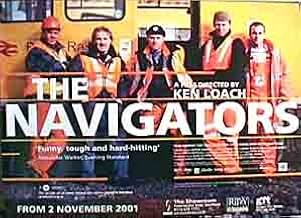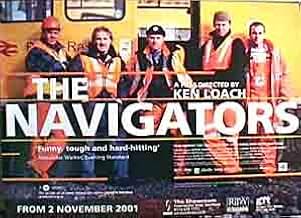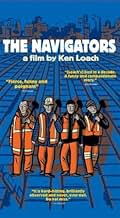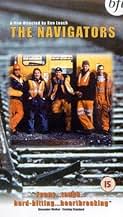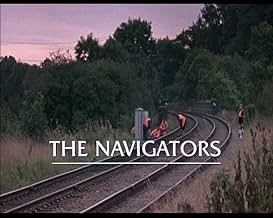VALUTAZIONE IMDb
6,9/10
3225
LA TUA VALUTAZIONE
Vivono nello Yorkshire. Lavorano per le ferrovie britanniche. E quando queste vengono privatizzate la loro vita cambia profondamente ma sono convinti che l'amicizia nata dal lavorare insieme... Leggi tuttoVivono nello Yorkshire. Lavorano per le ferrovie britanniche. E quando queste vengono privatizzate la loro vita cambia profondamente ma sono convinti che l'amicizia nata dal lavorare insieme li terrà uniti.Vivono nello Yorkshire. Lavorano per le ferrovie britanniche. E quando queste vengono privatizzate la loro vita cambia profondamente ma sono convinti che l'amicizia nata dal lavorare insieme li terrà uniti.
- Regia
- Sceneggiatura
- Star
- Ha vinto 1 BAFTA Award
- 3 vittorie e 3 candidature totali
Thomas Craig
- Mick
- (as Tom Craig)
Angela Forrest
- Tracy
- (as Angela Saville)
Recensioni in evidenza
Although it contains some funny moments, this film is no comedy; rather it is a biting satire of the mess that resulted when the Conservative Government in the UK decided to split up and privatise British Rail in 1995 (one wonders why they didn't go all the way and do the same to the highways) as seen through the eyes of track workers. Perhaps the most ludicrous moment is when their supervisor in their newly created regional private company tells the workers to take equipment out to dump bins and smash it up because "it isn't up to scratch, we've got to have high standards now." "But it's perfectly good, can't we sell it?" they protest. "What, sell it to the competition?" is the response. Later they are told that management's streamlining (making staff redundant) has been too successful: they are now too small to be viable and the depot has to close, the rest of the workers have to go. Aside from the almost documentary of the plight of Britain's rail network, there are personal interactions between the working class characters in their daily lives that viewers can empathise with. In all it's well cast, well scripted and well directed.
England. Mid 1990's. British Rail has been privatised and broken up into separate companies with all work put out to tender with the lowest bidder getting the job. This film follows a group of workers in a Yorkshire depot as the culture gradually changes from a world of union influence into a competitive business world.
This is a very sobering film - it deals with the railtrack situation but is more generally about the selling out of the working man and the beginning of the culture that views people as commodities and expenses, just like the rolling stock and the rails. The film opens with the boss of the depot announcing that the company has been privatised and that things will begin to change. It then follows the culture change over the course of time and concludes with a depressingly innocuous exchange that represents the shattering of previously unified spirits.
The culture change beings with mission statements, competing with work and setting levels for "acceptable deaths and continues with an end to previous agreements and a range of different companies. It is very hard to watch without being angry at the treatment of previously proud men as they are reduced to being costs. Workers are offered voluntary redundancy and those that refuse are gradually forced out. Bosses and chief execs identify those workers that have union ties and work to push them out. Workers are encouraged to join temp agencies at higher wages but without benefits or a steady work load thus saving the company money. Those that make trouble with the crews by insisting on safe working conditions etc are blackballed by the agencies and no more work is put their way. The pressure to cut costs to win jobs continues until unskilled workers are used for rail maintenance because they are paid cash in hand while other crews are forced to use "cost-effective" methods to work without a lookout and run the risk of severe accidents.
For those who think that the experiences of the workers are exaggerated for effect, Ken Loach received regular visits from railtrack workers (taking holidays or sick days) to advise on the film to make sure that it was representative of their experiences - they couldn't officially do it as they feared being blacklisted within the company. These things do go on - the rail companies are led by bosses who get huge bonuses from the shareholders as they drive down operating costs by compromising safety and reducing the workforce costs.
If the film has a major flaw it is the one-sided nature of the script. Workers are all represented as jovial, hardworking types, you know - salt of the earth, put down by bosses who only care about money. The latter may well be true but the way the workers constantly joke etc makes them look too good and the film has far too much sympathy for them for it's own good. Even when a group of workers do something completely abhorrent (the end of the film) it is presented as something that they had no choice about whereas really they should have carried some of the blame.
This film was released in Europe but only had a limited release in the UK as it was screened first on TV. It came shortly after the collapse of Railtrack as the Government put it into administration. It was screened days after the Government tried to cover up a report of failing train performances etc and it was screened as inquiries continue into serious derailments with significant loss of life.
In the UK one major accident killed many passengers and was put down to badly maintained rails. The Chief Exec has thus far escaped charges of manslaughter (despite the findings of the Health & Safety Executive) and also left his job with his huge contractually-obliged bonus, before moving on to another job on another board. For those who think that this film is exaggerated you truly have no idea what's going on in the world of big business.
As the Government continue plans for part privatisation of the London Underground and have further plans to privatise air traffic control this film is a very scary thing. Once we forget the people who make up workforces that only leave numbers. When shareholders become more important than the public and the workers then costs are all that matters and all corners are cut to boost the share price.
This film has it's flaws and will not change Government policy one bit. But this is a very sobering film that will open you eyes to what is done to satisfy shareholders and earn bonuses for upper management.
This is a very sobering film - it deals with the railtrack situation but is more generally about the selling out of the working man and the beginning of the culture that views people as commodities and expenses, just like the rolling stock and the rails. The film opens with the boss of the depot announcing that the company has been privatised and that things will begin to change. It then follows the culture change over the course of time and concludes with a depressingly innocuous exchange that represents the shattering of previously unified spirits.
The culture change beings with mission statements, competing with work and setting levels for "acceptable deaths and continues with an end to previous agreements and a range of different companies. It is very hard to watch without being angry at the treatment of previously proud men as they are reduced to being costs. Workers are offered voluntary redundancy and those that refuse are gradually forced out. Bosses and chief execs identify those workers that have union ties and work to push them out. Workers are encouraged to join temp agencies at higher wages but without benefits or a steady work load thus saving the company money. Those that make trouble with the crews by insisting on safe working conditions etc are blackballed by the agencies and no more work is put their way. The pressure to cut costs to win jobs continues until unskilled workers are used for rail maintenance because they are paid cash in hand while other crews are forced to use "cost-effective" methods to work without a lookout and run the risk of severe accidents.
For those who think that the experiences of the workers are exaggerated for effect, Ken Loach received regular visits from railtrack workers (taking holidays or sick days) to advise on the film to make sure that it was representative of their experiences - they couldn't officially do it as they feared being blacklisted within the company. These things do go on - the rail companies are led by bosses who get huge bonuses from the shareholders as they drive down operating costs by compromising safety and reducing the workforce costs.
If the film has a major flaw it is the one-sided nature of the script. Workers are all represented as jovial, hardworking types, you know - salt of the earth, put down by bosses who only care about money. The latter may well be true but the way the workers constantly joke etc makes them look too good and the film has far too much sympathy for them for it's own good. Even when a group of workers do something completely abhorrent (the end of the film) it is presented as something that they had no choice about whereas really they should have carried some of the blame.
This film was released in Europe but only had a limited release in the UK as it was screened first on TV. It came shortly after the collapse of Railtrack as the Government put it into administration. It was screened days after the Government tried to cover up a report of failing train performances etc and it was screened as inquiries continue into serious derailments with significant loss of life.
In the UK one major accident killed many passengers and was put down to badly maintained rails. The Chief Exec has thus far escaped charges of manslaughter (despite the findings of the Health & Safety Executive) and also left his job with his huge contractually-obliged bonus, before moving on to another job on another board. For those who think that this film is exaggerated you truly have no idea what's going on in the world of big business.
As the Government continue plans for part privatisation of the London Underground and have further plans to privatise air traffic control this film is a very scary thing. Once we forget the people who make up workforces that only leave numbers. When shareholders become more important than the public and the workers then costs are all that matters and all corners are cut to boost the share price.
This film has it's flaws and will not change Government policy one bit. But this is a very sobering film that will open you eyes to what is done to satisfy shareholders and earn bonuses for upper management.
Marvelous film set in South Yorkshire, using local actors and comedians, done not so much in a documentary style, but with a documentary feel, about a group of railroad track workers during the privatization of British Rail. The culture changing from one of unionized steady jobs, to one of freelancing with no health care or holidays and for the sake of economy, stretching security which leads to the death of one of the workers. This presumably low budget film, shot all on location, is gritty, real, and is a wonderful insight into the British working class and its humor. A real treasure.
The fact that the previous reviewer apparently had other problems on her mind at the time should not dissuade anyone from seeing this excellent example of Ken Loach's work.
The fact that the previous reviewer apparently had other problems on her mind at the time should not dissuade anyone from seeing this excellent example of Ken Loach's work.
As always, a social issue is beautifully intertwined with personal drama: sad, funny, true like life itself. And cinema itself. It's a relief to see someone can entertain and move us in this way, that's definitely not the present-day Hollywood way. On the other hand, Loach's career is brilliant from beginning to end with the only possible exception of Carla's Song that I consider a faux-pas. Like all great artists, Loach with this films add something to our understanding of ourselves, and our present history. I supposed that you understood I liked it. Still it seems I've lost the best: the liverpuldian parley. In Italy unfortunately all these films come dubbed.
I saw the movie today. It is good to know that while in Hollywood the so called entertainment industry wants to send our minds and conscious into sleep, comes a real humanist film maker and serves as a voice of society in a crisis, of real people like all of us that deal with problems that surface everywhere in the world. How men can survive and remain human and moral while fighting in vain in every establishment, including ones that suppose to help the individual. It is not just a Marxist manifesto but rather a compassion, loving, caring and worried look at a group of people that want to survive in a world that is changing rapidly economically and morally. You'll laugh with them, get frustrated with them and feel pity for them when they make the wrong choice (if such a thing can be defined). As always with Loach's films, it's so reliable that you immediately feel that the characters are a part of your life and there are no actors and no movie - just a look at familiar people who struggle to keep their jobs against a system that doesn't really care for its human resources and by that hurt them and herself. It is really touching and heart-tearing as much as loving with even quite a lot bits of humor which make it more credible. A real must!
Lo sapevi?
- BlooperThe vest that John wears in the beginning (with the meter) and end (their last job), is actually a British Rail safety vest, over his Gilchrist coat (when he moves you can see the gray on it). He has the combination on before the company is renamed Gilchrist Engineering.
- ConnessioniReferenced in Il était une fois...: Moi, Daniel Blake (2021)
I più visti
Accedi per valutare e creare un elenco di titoli salvati per ottenere consigli personalizzati
- How long is The Navigators?Powered by Alexa
Dettagli
- Data di uscita
- Paesi di origine
- Siti ufficiali
- Lingua
- Celebre anche come
- The Navigators
- Luoghi delle riprese
- Aziende produttrici
- Vedi altri crediti dell’azienda su IMDbPro
Botteghino
- Lordo Stati Uniti e Canada
- 3052 USD
- Fine settimana di apertura Stati Uniti e Canada
- 1940 USD
- 23 feb 2003
- Lordo in tutto il mondo
- 1.807.686 USD
- Tempo di esecuzione1 ora 36 minuti
- Colore
- Mix di suoni
- Proporzioni
- 1.85 : 1
Contribuisci a questa pagina
Suggerisci una modifica o aggiungi i contenuti mancanti

Divario superiore
By what name was Paul, Mick e gli altri (2001) officially released in Canada in English?
Rispondi
